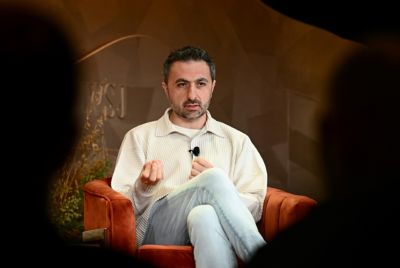How One Technologist is Empowering Tomorrow's AI Leaders One Platform at a Time
From judging world-class AI hackathons to authoring books on generative tech, Saptarshi Banerjee is redefining what it means to lead in the open-source AI era

AI is often framed as the preserve of elite research labs and billion-dollar corporations, where progress emerges behind closed doors. To counteract this, there must be a new kind of tech leader — one who not only understands the complexity of this technology but also knows how to encourage others to advance in this field by equipping them with the right tools.
A clear example of this shift is Saptarshi Banerjee, a technologist, researcher, author, and global AI speaker whose career illustrates how open knowledge, community engagement, and shared platforms can influence the future of generative AI. Saptarshi's work, spanning competitive hackathons, international judging panels, public mentorship, and forthcoming academic texts, aims to show his belief that AI should be built out in the open, with contributions from a diverse and global community of builders.
How Saptarshi Understood the Value of Competition
While studying computer science at Illinois Tech in Chicago, Saptarshi began assisting hackathons across the United States, earning national recognition at events such as CalHacks and HackIllinois. One winning project, a real-time 'Uber for Healthcare' system that connected patients with available healthcare providers, foreshadowed how urgent care delivery could harness AI well before telemedicine became mainstream.
These experiences highlighted the potential of spaces that encourage rapid feedback and prototyping, as well as how they could be a dynamic and effective solution to solving technical gaps in technological devices. More importantly, they shaped Saptarshi's conviction that technical leadership should not be confined to theory or corporate research, but tested and shared through collective challenges that democratize participation.
This ethos carried into his later career as he architected AI for different companies. Specifically, he's focused on building agents which can automatically take care of specific tasks for companies. He's dealt with not only building them but enhancing them using technologies like retrieval-augmented generation techniques to offer these agents access to third-party data in real-time, or Model Context Protocols (MCPs) which provide a standardise interface to connect fragmented platforms.
But over time, more so than the technical kinks of AI and how it could have wider enterprise implementations, Saptarshi's enduring interest became developing strategies to provide students, researchers, and early-career engineers access to the knowledge and platforms to apply them.
Judging at the Frontlines of New Ideas
Today, Saptarshi acts as a recurring judge at many global AI hackathons sponsored by corporations like Google DeepMind, Perplexity AI, AWS, Y Combinator, and Anthropic.
These have included an MCP-focused edition hosted on AWS with support from Perplexity, where participants explored the ways in which agents can communicate through shared protocols, an AI-Agents sprint held alongside NVIDIA's GTC conference, and a Global Agent Hackathon that invited developers to build quality assistants that can provide outputs with greater context and inference. He's also evaluated projects for the QS Reimagine Education Awards, a platform that has been described as the 'Oscars of EdTech'.
But he doesn't just focus on existing competitions. He's also assisted in developing his own. In 2025, he helped organise one of the largest AI hackathons in the Bay Area, which brought together hundreds of participants, $50,000 in prizes, and sponsorships from leading companies in cloud and security.
For Saptarshi, these types of events allow collaboration to bloom across disciplines and demographics, producing networks as valuable as the prototypes themselves. He describes them as 'sandboxes for the future', spaces where promising engineers can refine their talents, risk-taking is encouraged, and problems are tackled without the weight of corporate bureaucracy. Judging, for him, is less about identifying winners and more about giving promising ideas their necessary space to develop and grow.
By helping shape the criteria of these competitions, Saptarshi is focusing not only on who gets industry acclaim but also which underlying values are rewarded in this growing ecosystem. In this way, his presence on judging panels signals a rebalancing of incentives toward opening the entry barrier for AI into broader communities.
His Belief in Open Knowledge as a Public Good
Saptarshi also serves as an active speaker on multiple platforms, where he's gone deep into how to further expand AI's technical foundation. He has presented at conferences like BrightTalk, SCSP + AI Summit, the KubeFM podcast, and the IEEE Cloud Summit, where he has discussed topics related to how to deploy AI on the cloud.
In addition, Saptarshi is sharing his knowledge through two upcoming books with Springer Nature: Agentic AI: Architecting Autonomous Systems for the Enterprise and Scaling and Integrating Generative AI Across Enterprise Systems. Both works synthesize years of research and apply said research to real operations, which allows him to present strategies for operationalising AI without skimping on transparency or effectiveness.
Through these initiatives, Saptarshi Banerjee is showing how AI can only progress when it's accessible and open to experimentation and collaboration. His work shows how community-driven initiatives can expand participation and serve as the groundwork for more promising outcomes and products, setting a future where the success of AI will be based on how effectively the ecosystem nurtures the builders of tomorrow.
If you want to keep up with Saptarshi Banerjee's work, connect with him on LinkedIn.
© Copyright IBTimes 2025. All rights reserved.





















